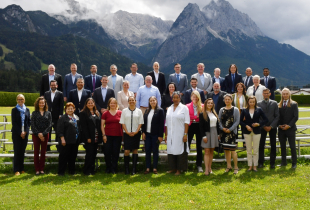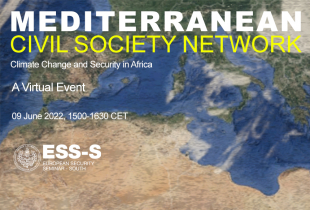
European Security Seminar - North 2023 A Cooperative Future: Opportunities for the Arctic 7
The Arctic is at an inflection point and policymakers must take action to ensure the future of the Arctic region is one of stability and prosperity – while also contending with major changes to global dynamics in the political, economic, and environmental arenas that extend far south of the Arctic Circle. Russia’s invasion of Ukraine continues to have significant impacts for the Arctic region, ending the ‘Arctic Exceptionalism’ that had dominated the region for decades. Cooperative mechanisms and dialogue largely remain at a standstill, as the Western world remains unified in support of international laws and norms. Climate change is acting as an accelerant for the resource-rich region that is brimming with potential for economic development and, with that, strategic competition. As nations reorient to the new geopolitical realities, like-minded stakeholders have an emerging opportunity to cooperatively address regional challenges and chart an innovative course for the Arctic.
In September 2023, nearly 50 security practitioners, policymakers, diplomats, academics, and executives representing fourteen Arctic nations and like-minded stakeholders gathered for the George C. Marshall European Center for Security Studies (GCMC) and Ted Stevens Center for Arctic Security Studies’ (TSC) co-hosted European Security Seminar – North to continue discussions regarding the future of security and stability in the Arctic region. Building upon the foundational dialogue and findings of previous iterations, this year’s cohort sought to exchange regional perspectives, enhance understanding of Arctic security challenges, and chart a course for the Arctic 7 and like-minded stakeholders to address common challenges spanning the security spectrum. The findings in this paper do not necessarily reflect the individual views of participants or the hosting institutions, but rather the consensus of the invited experts reflecting a diverse array of expertise.
This paper seeks to capture the key discussions and findings of this year’s ESS-N, focusing on an assessment of the current state of the region and offering recommendations for actions to mitigate challenges and to chart a new course for the future in order to improve regional security and stability.
About the Authors
CDR Rachael Gosnell is a Military Professor at the George C. Marshall European Center for Security Studies. She is a doctoral candidate in International Security and Economic Policy at the University of Maryland, with a focus on Arctic security. She holds a MA in International Security Studies from Georgetown University, a Masters in Engineering Management from Old Dominion University, and a Bachelor of Science in Political Science from the U.S. Naval Academy.
CAPT Joseph “Grant” Thomas, Jr. is the U.S. Coast Guard Liaison to the Ted Stevens Center for Arctic Security Studies. He serves as an Instructor in the School of Arctic and Climate Security Studies (SACSS).
The George C. Marshall European Center for Security Studies
The George C. Marshall European Center for Security Studies in Garmisch-Partenkirchen, Germany, is a German-American partnership and trusted global network promoting common values and advancing collaborative geostrategic solutions. The Marshall Center’s mission to educate, engage, and empower security partners to collectively affect regional, transnational, and global challenges is achieved through programs designed to promote peaceful, whole of government approaches to address today’s most pressing security challenges. Since its creation in 1992, the Marshall Center’s alumni network has grown to include over 15,000 professionals from 157 countries. More information on the Marshall Center can be found online at www.marshallcenter.org.
The Ted Stevens Center for Arctic Security Studies
The Ted Stevens Center for Arctic Security Studies is committed to innovation and excellence in Arctic defense education, practitioner relevant research, and collaborations with America’s Arctic security Allies and partners. The Stevens Center’s mission is to build strong, sustainable, domestic and international networks of security leaders and promote and conduct focused research on Arctic security to advance DoD security priorities in the Arctic region. More information on the Stevens Center can be found online at www.tedstevensarcticcenter.org.
This paper reflects the views of the authors and is not necessarily the official policy of the United States, Germany, or any other governments.

